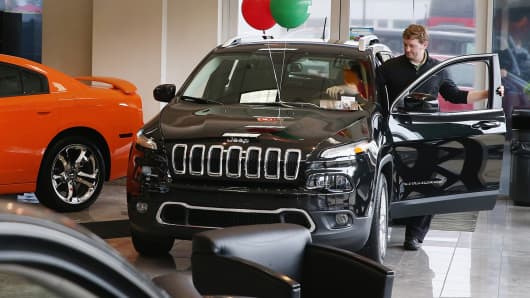(Updates share price in fifth paragraph.)
Feb. 26 (Bloomberg) -- Tesla Motors Inc.'s plan to boost battery production by building what Chief Executive Officer Elon Musk calls a "gigafactory" may do more to transform the power industry than it does to advance the electric car.
Utility customers throughout the U.S. have already begun turning to battery storage and solar panels as a way of reducing electricity bills and their dependency on local power companies. The trend threatens the more than 100-year-old monopoly utility business model that books about $360 billion in annual power sales.
By lowering the cost of energy-storage with its lithium-ion batteries, Tesla could accelerate the disruption of the electric utility business as it doubles its share of the global car market to about 1 percent, Adam Jonas, a Morgan Stanley analyst, wrote in a note yesterday. Morgan Stanley's note helped push Tesla's market value above $30 billion for the first time yesterday, as the company's Model S sedan also became the first U.S. car to receive Consumer Reports ' "best overall pick" in the magazine's annual ranking.
"If it can be a leader in commercializing battery packs, investors may never look at Tesla the same way again," said Jonas, who rates the shares the equivalent of a Online Deals. "If Tesla can become the world's low-cost producer in energy storage, we see significant optionality for Tesla to disrupt adjacent industries."
Utility Obsolescence
Tesla gained 5.8 percent to $262.32 at 9:38 a.m. in New York. The shares have climbed more than sevenfold in the past year. The company has said it may partner on the new battery plant with Panasonic Corp., which rose 5.3 percent to close at 1,259 yen in Tokyo trading, the highest in about three weeks.
NRG Energy Inc. Chief Executive Officer David Crane, who says the U.S. utility industry is doomed to obsolescence unless it changes, drives himself to work every day in his Tesla Model S.
Tesla's Musk told Bloomberg Television last week that the company plans to provide details on a proposed "gigafactory" to produce the batteries needed to make more affordable vehicles. With each Tesla capable of storing enough energy to power the average house for 3.5 days, a growing population of Tesla cars represents a significant increase in how much electricity can be held in a country's infrastructure.
' Holy Grail '
Worldwide, the market for energy storage is expected to grow from about $500 million to about $12 billion in 2023, according to Navigant Consulting Inc.
Homeowners might use battery storage, combined with solar power, to further reduce their dependence on utilities and potentially sell electricity back to the grid, a new business model known as distributed generation. Batteries allow customers with solar panels to store energy during the day and then tap the excess overnight when the sun goes down.
"Battery storage is the holy grail of the distributed generation movement," said Travis Miller, an analyst at Morningstar Inc. "If developers can create a high-capacity battery technology, it opens the door to a significant increase in options for customers to supply their own power."
While still considered too expensive for wide-scale adoption, a drastic reduction in the cost of home energy storage systems would be a "game changer," American Electric Power Co. Chairman and Chief Executive Officer Nick Akins said during an interview last year.
"If you can get batteries cheap enough and combine them with solar panels, you no longer need the utility," said Sam Jaffe, an analyst with Navigant. "Then the question is how cheap does it have to be? And it has to be really, really, really cheap."
New Partnerships
Tesla would have to reduce the costs of its batteries by more then 70 percent for it to make sense for most homeowners to producer their own electricity, Jaffe said.
Companies already are tapping into grid storage. NRG Energy said a year ago it started selling power from electric cars to the nation's largest power grid in a partnership with the University of Delaware. SolarCity Corp. is now offering Tesla batteries as part of a power-storage system for commercial customers in parts of California and New England that will reduce utility bills and provide electricity during blackouts.
SunPower Corp., the second-largest U.S. solar-panel maker, said in December that it was testing use of power-storage systems to couple with its rooftop solar units.
California has opened up the market for the technology by requiring the state's utilities to use 1.3 gigawatts of storage by the end of this decade.
California Innovation
Musk and SolarCity CEO Lyndon Rive are scheduled to speak on innovation before state regulators on Feb. 27, according to an e-mailed statement today from the California Public Utilities Commission.
"The scale of Tesla's battery production, even for its own use as an auto manufacturer, thrusts the company into 'key player' status for grid storage," Morgan Stanley's Jonas said in his note.
The battery plant would be built with partners, and "there's a likelihood Panasonic would be part of it," Musk told Bloomberg last week. Panasonic Corp. is both a Tesla investor and its main supplier of lithium-ion cells. Panasonic's participation is "not 100 percent confirmed," he said.
"Nothing has been decided at this stage, however Panasonic has a cooperative relationship with Tesla, and the company will look into a variety of options," Chieko Gyobu, a spokeswoman for Panasonic, said by e-mail.
--With assistance from Christopher Martin and Niamh Ring in New York and Grace Huang in Tokyo. Editors: Susan Warren, Tina Davis
To contact the reporter on this story: Mark Chediak in San Francisco at mchediak@bloomberg.net
To contact the editor responsible for this story: Susan Warren at susanwarren@bloomberg.net





